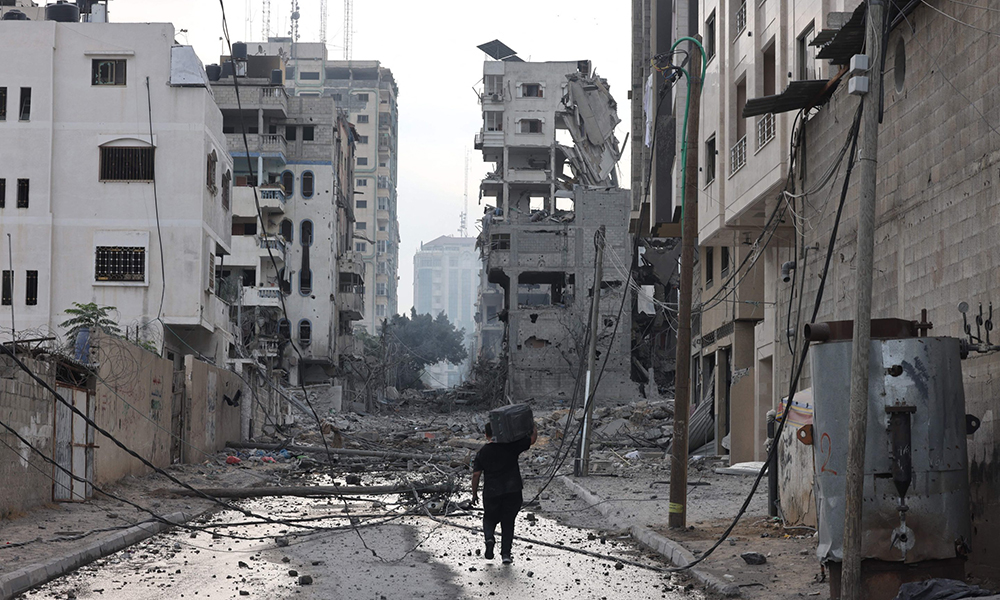
以色列與哈馬斯之間的沖突,喚起了人們對(duì)1973年“贖罪日戰(zhàn)爭(zhēng)”引發(fā)的石油危機(jī)的回憶,。德意志銀行(Deutsche Bank)的策略師本周甚至發(fā)出警告,,隨著中東事態(tài)持續(xù)升級(jí),,全世界像上世紀(jì)70年代一樣發(fā)生滯脹的可能性越來(lái)越高。所謂滯脹是指低增長(zhǎng)和高通脹的可怕組合,。
然而,,標(biāo)普全球(S&P Global)副董事長(zhǎng)丹尼爾·耶金在接受美國(guó)消費(fèi)者新聞與商業(yè)頻道(CNBC)采訪(fǎng)時(shí)表示,,歷史不會(huì)重演,。這位石油行業(yè)專(zhuān)家強(qiáng)調(diào):“盡管人們紛紛聯(lián)想到1973年的石油危機(jī),但這一次的情況截然不同,?!?/p>
耶金是一位曾獲普利策獎(jiǎng)殊榮的作家,他出版了多部涵蓋能源市場(chǎng)的著作,。他認(rèn)為,,包括沙特在內(nèi)的海灣地區(qū)主要石油生產(chǎn)國(guó)仍然希望與以色列建立“建設(shè)性的關(guān)系”。他指出,,這意味著以色列與哈馬斯目前的沖突構(gòu)成一種“地緣政治風(fēng)險(xiǎn)”,,短期內(nèi)可能導(dǎo)致油價(jià)上漲,但這并不意味著會(huì)像上世紀(jì)70年代那樣爆發(fā)全面的石油危機(jī),。在那次危機(jī)中,,買(mǎi)油的人們?cè)诮诸^排起了長(zhǎng)龍。
上周一,,以色列戰(zhàn)爭(zhēng)爆發(fā)后,,油價(jià)暴漲4.2%,達(dá)到每桶88.15美元,,到周二下午,,國(guó)際基準(zhǔn)布倫特原油價(jià)格下跌0.74%,降至87.50美元,。
約50年前,,以色列與以埃及和敘利亞為首的多個(gè)阿拉伯國(guó)家,在西奈半島和戈蘭高地發(fā)生領(lǐng)土爭(zhēng)奪戰(zhàn),,1967年,,這兩個(gè)地區(qū)被以色列占領(lǐng)。美國(guó)在沖突中決定支持以色列,,最終導(dǎo)致了石油禁運(yùn)和阿拉伯石油輸出國(guó)組織(Organization of Arab Petroleum Exporting Countries,,OAPEC)減產(chǎn),導(dǎo)致油價(jià)在幾個(gè)月內(nèi)暴漲300%,。
但耶金并不認(rèn)為此次油價(jià)會(huì)大幅上漲,,主要是因?yàn)樵褪袌?chǎng)的供需狀況與當(dāng)時(shí)截然不同。他指出,,2023年,,即使在石油鉆井?dāng)?shù)量減少的情況下,,美國(guó)原油產(chǎn)量仍在持續(xù)增長(zhǎng)。美國(guó)能源信息署(Energy Information Administration)的最新數(shù)據(jù)顯示,,7月,,美國(guó)原油產(chǎn)量同比增長(zhǎng)了近10%,達(dá)到每天1,290萬(wàn)桶,。
耶金解釋稱(chēng):“今年,,非歐佩克+產(chǎn)油國(guó)的石油產(chǎn)量增長(zhǎng)基本超過(guò)了[石油]需求增長(zhǎng)?!彼J(rèn)為,,除非中東發(fā)生更大規(guī)模的沖突,否則當(dāng)前的石油需求無(wú)法支持更高的油價(jià),。
澳大利亞投行麥格里(Macquarie)的經(jīng)濟(jì)學(xué)主管大衛(wèi)·多伊爾在接受《財(cái)富》雜志采訪(fǎng)時(shí),,對(duì)耶倫的說(shuō)法表示認(rèn)同。他表示上世紀(jì)70年代的危機(jī)預(yù)計(jì)不會(huì)重演,。麥格里管理的資產(chǎn)規(guī)模超過(guò)5,500億美元,。
他說(shuō)道:“目前,只要沖突不超出局部沖突的范圍,,就不會(huì)對(duì)我們的[全球經(jīng)濟(jì)增長(zhǎng)]前景產(chǎn)生嚴(yán)重影響,。”他認(rèn)為,,目前油價(jià)上漲只會(huì)“在邊緣”對(duì)通脹產(chǎn)生適度的影響,。
他補(bǔ)充道:“我認(rèn)為,除非沖突升級(jí)成區(qū)域性沖突,,才會(huì)產(chǎn)生更嚴(yán)重的影響,,然后你會(huì)看到更嚴(yán)重的后果?!?/p>
巨大風(fēng)險(xiǎn)
1973年的石油危機(jī)顯然不太可能再次發(fā)生,,但如果以色列與哈馬斯的沖突升級(jí),歷史重演并非不可能,。標(biāo)普全球的耶金在接受CNBC采訪(fǎng)時(shí)表示:“一個(gè)重要的問(wèn)題是,,沖突是否牽涉到伊朗?”
這位石油業(yè)專(zhuān)家擔(dān)心,,如果伊朗卷入發(fā)生在以色列發(fā)生的沖突,,美國(guó)可能會(huì)進(jìn)一步加強(qiáng)對(duì)伊朗的制裁。盡管伊朗的石油產(chǎn)量?jī)H占全球石油供應(yīng)的約4%,,但在歐佩克+減產(chǎn)協(xié)議后,,伊朗一直在增加原油出口。據(jù)路透社報(bào)道,,今年8月,,伊朗日產(chǎn)石油達(dá)到315萬(wàn)桶,,創(chuàng)下自2018年以來(lái)的最高水平。
因此,,在線(xiàn)銀行瑞訊銀行(Swissquote)的高級(jí)分析師伊派克·奧茲卡戴斯卡亞表示:“伊朗與以色列進(jìn)而與美國(guó)的緊張關(guān)系升級(jí),,可能對(duì)全球石油產(chǎn)量造成嚴(yán)重后果?!?/p>
雖然中東事態(tài)升級(jí)可能影響伊朗的原油供應(yīng),,但全球能源市場(chǎng)面臨的真正威脅是美國(guó)或其他西方國(guó)家的油輪遭到攻擊。
耶金總結(jié)指出:“顯然,,如果伊朗牽涉其中,,風(fēng)險(xiǎn)將大幅上升,。問(wèn)題在于,,美國(guó)是否會(huì)進(jìn)一步加強(qiáng)對(duì)伊朗石油的制裁,以及伊朗是否會(huì)扣押油輪作為回應(yīng),?但現(xiàn)在討論這些問(wèn)題還為時(shí)尚早,。”(財(cái)富中文網(wǎng))
翻譯:劉進(jìn)龍
審校:汪皓
以色列與哈馬斯之間的沖突,,喚起了人們對(duì)1973年“贖罪日戰(zhàn)爭(zhēng)”引發(fā)的石油危機(jī)的回憶,。德意志銀行(Deutsche Bank)的策略師本周甚至發(fā)出警告,隨著中東事態(tài)持續(xù)升級(jí),,全世界像上世紀(jì)70年代一樣發(fā)生滯脹的可能性越來(lái)越高,。所謂滯脹是指低增長(zhǎng)和高通脹的可怕組合。
然而,,標(biāo)普全球(S&P Global)副董事長(zhǎng)丹尼爾·耶金在接受美國(guó)消費(fèi)者新聞與商業(yè)頻道(CNBC)采訪(fǎng)時(shí)表示,,歷史不會(huì)重演。這位石油行業(yè)專(zhuān)家強(qiáng)調(diào):“盡管人們紛紛聯(lián)想到1973年的石油危機(jī),,但這一次的情況截然不同,。”
耶金是一位曾獲普利策獎(jiǎng)殊榮的作家,,他出版了多部涵蓋能源市場(chǎng)的著作,。他認(rèn)為,包括沙特在內(nèi)的海灣地區(qū)主要石油生產(chǎn)國(guó)仍然希望與以色列建立“建設(shè)性的關(guān)系”,。他指出,,這意味著以色列與哈馬斯目前的沖突構(gòu)成一種“地緣政治風(fēng)險(xiǎn)”,短期內(nèi)可能導(dǎo)致油價(jià)上漲,,但這并不意味著會(huì)像上世紀(jì)70年代那樣爆發(fā)全面的石油危機(jī),。在那次危機(jī)中,買(mǎi)油的人們?cè)诮诸^排起了長(zhǎng)龍,。
上周一,,以色列戰(zhàn)爭(zhēng)爆發(fā)后,,油價(jià)暴漲4.2%,達(dá)到每桶88.15美元,,到周二下午,,國(guó)際基準(zhǔn)布倫特原油價(jià)格下跌0.74%,降至87.50美元,。
約50年前,,以色列與以埃及和敘利亞為首的多個(gè)阿拉伯國(guó)家,在西奈半島和戈蘭高地發(fā)生領(lǐng)土爭(zhēng)奪戰(zhàn),,1967年,,這兩個(gè)地區(qū)被以色列占領(lǐng)。美國(guó)在沖突中決定支持以色列,,最終導(dǎo)致了石油禁運(yùn)和阿拉伯石油輸出國(guó)組織(Organization of Arab Petroleum Exporting Countries,,OAPEC)減產(chǎn),導(dǎo)致油價(jià)在幾個(gè)月內(nèi)暴漲300%,。
但耶金并不認(rèn)為此次油價(jià)會(huì)大幅上漲,,主要是因?yàn)樵褪袌?chǎng)的供需狀況與當(dāng)時(shí)截然不同。他指出,,2023年,,即使在石油鉆井?dāng)?shù)量減少的情況下,美國(guó)原油產(chǎn)量仍在持續(xù)增長(zhǎng),。美國(guó)能源信息署(Energy Information Administration)的最新數(shù)據(jù)顯示,,7月,美國(guó)原油產(chǎn)量同比增長(zhǎng)了近10%,,達(dá)到每天1,290萬(wàn)桶,。
耶金解釋稱(chēng):“今年,非歐佩克+產(chǎn)油國(guó)的石油產(chǎn)量增長(zhǎng)基本超過(guò)了[石油]需求增長(zhǎng),?!彼J(rèn)為,除非中東發(fā)生更大規(guī)模的沖突,,否則當(dāng)前的石油需求無(wú)法支持更高的油價(jià),。
澳大利亞投行麥格里(Macquarie)的經(jīng)濟(jì)學(xué)主管大衛(wèi)·多伊爾在接受《財(cái)富》雜志采訪(fǎng)時(shí),對(duì)耶倫的說(shuō)法表示認(rèn)同,。他表示上世紀(jì)70年代的危機(jī)預(yù)計(jì)不會(huì)重演,。麥格里管理的資產(chǎn)規(guī)模超過(guò)5,500億美元。
他說(shuō)道:“目前,,只要沖突不超出局部沖突的范圍,,就不會(huì)對(duì)我們的[全球經(jīng)濟(jì)增長(zhǎng)]前景產(chǎn)生嚴(yán)重影響。”他認(rèn)為,,目前油價(jià)上漲只會(huì)“在邊緣”對(duì)通脹產(chǎn)生適度的影響,。
他補(bǔ)充道:“我認(rèn)為,除非沖突升級(jí)成區(qū)域性沖突,,才會(huì)產(chǎn)生更嚴(yán)重的影響,,然后你會(huì)看到更嚴(yán)重的后果?!?/p>
巨大風(fēng)險(xiǎn)
1973年的石油危機(jī)顯然不太可能再次發(fā)生,,但如果以色列與哈馬斯的沖突升級(jí),歷史重演并非不可能,。標(biāo)普全球的耶金在接受CNBC采訪(fǎng)時(shí)表示:“一個(gè)重要的問(wèn)題是,,沖突是否牽涉到伊朗?”
這位石油業(yè)專(zhuān)家擔(dān)心,,如果伊朗卷入發(fā)生在以色列發(fā)生的沖突,,美國(guó)可能會(huì)進(jìn)一步加強(qiáng)對(duì)伊朗的制裁。盡管伊朗的石油產(chǎn)量?jī)H占全球石油供應(yīng)的約4%,,但在歐佩克+減產(chǎn)協(xié)議后,,伊朗一直在增加原油出口。據(jù)路透社報(bào)道,,今年8月,伊朗日產(chǎn)石油達(dá)到315萬(wàn)桶,,創(chuàng)下自2018年以來(lái)的最高水平,。
因此,在線(xiàn)銀行瑞訊銀行(Swissquote)的高級(jí)分析師伊派克·奧茲卡戴斯卡亞表示:“伊朗與以色列進(jìn)而與美國(guó)的緊張關(guān)系升級(jí),,可能對(duì)全球石油產(chǎn)量造成嚴(yán)重后果,。”
雖然中東事態(tài)升級(jí)可能影響伊朗的原油供應(yīng),,但全球能源市場(chǎng)面臨的真正威脅是美國(guó)或其他西方國(guó)家的油輪遭到攻擊,。
耶金總結(jié)指出:“顯然,如果伊朗牽涉其中,,風(fēng)險(xiǎn)將大幅上升,。問(wèn)題在于,美國(guó)是否會(huì)進(jìn)一步加強(qiáng)對(duì)伊朗石油的制裁,,以及伊朗是否會(huì)扣押油輪作為回應(yīng),?但現(xiàn)在討論這些問(wèn)題還為時(shí)尚早?!保ㄘ?cái)富中文網(wǎng))
翻譯:劉進(jìn)龍
審校:汪皓
The Israel-Hamas conflict has revived memories of the Yom Kippur War that sparked the 1973 oil crisis. Deutsche Bank’s strategists even warned this week that the odds of 1970s-style stagflation—a toxic combination of low growth and high inflation—are increasing around the world amid the escalating war in the Middle East.
But Daniel Yergin, vice chairman of S&P Global, told CNBC Tuesday that he doesn’t believe history is repeating itself. “Everybody looks back at the oil crisis of 1973, but this is so different,” the oil guru said.
Yergin, a Pulitzer Prize–winning author of multiple books on the energy markets, argued that the major oil producers in the gulf, including Saudi Arabia, still want a “constructive relationship” with Israel. That means the ongoing Israel-Hamas conflict is a “geopolitical risk” that could increase the price of oil somewhat in the near term, he said, but it’s not the harbinger of a full-on oil crisis like the lines-around-the-block 1970s.
After surging 4.2% to $88.15 per barrel Monday in response to the war in Israel, international benchmark Brent crude prices fell 0.74% to $87.50 by Tuesday afternoon.
Some 50 years ago, Israel and a coalition of Arab states led by Egypt and Syria fought over territory in the Sinai Peninsula and the Golan Heights, which were occupied by Israel in 1967. The U.S.’s decision to back Israel in the conflict ultimately led to an oil embargo and production cuts from the Organization of Arab Petroleum Exporting Countries (OAPEC), which caused the price of oil to surge 300% in a matter of months.
But Yergin doesn’t believe oil prices will spike so dramatically this time, largely because the supply-and-demand dynamics in the crude market are far different now. He noted that U.S. crude production has continued to surge in 2023, even with a declining oil rig count. The Energy Information Administration’s latest data shows that U.S. crude oil production rose nearly 10% from a year ago in July to 12.9 million barrels per day.
“Basically, non-OPEC+ oil, the growth in that this year, is greater than the growth in [oil] demand,” Yergin explained, arguing that current demand for oil won’t be able to support higher prices, barring a much more major conflict in the Middle East.
David Doyle, head of economics at Macquarie, an Australian investment bank with over $550 billion in assets under management, echoed Yergin’s comments in an interview with Fortune Tuesday, saying that he doesn’t expect a repeat of the 1970s.
“At this point, as long as it doesn’t broaden out beyond the more local conflict, I have a hard time seeing this having a significant impact on our [global economic growth] outlook,” he said, arguing there will only be a mild impact “at the margin” on inflation from rising oil prices for now.
“I think in order for there to be a more significant impact, you would need to see the conflict escalate into a more regional conflict and then you could see more significant ramifications flowing from that,” he added.
The big risk
A repeat of the 1973 oil crisis clearly isn’t currently under way, but that outcome still isn’t out of the realm of possibilities if the Israel-Hamas conflict escalates. “The big question is, will it involve Iran?” S&P Global’s Yergin told CNBC Tuesday.
The oil guru fears that if Iran gets involved in the conflict in Israel, the U.S. might increase its sanctions against the nation. Iran produces only around 4% of the world’s oil supply, but the country has been increasing its crude exports at a time when OPEC+ has cut its output. Iran produced 3.15 million barrels of oil per day in August, the most since 2018, Reuters reported.
As a result: “An escalation of tensions between Iran and Israel, hence the U.S., could have severe consequences for global oil production,” Ipek Ozkardeskyay, a senior analyst at the online bank Swissquote, said Tuesday.
And while crude supply out of Iran could be affected if tensions in the Middle East escalate, the real threat to the global energy markets may be attacks on U.S. or other Western oil tankers.
“Obviously, if Iran is involved, that raises the stakes. The question then is, does the U.S. tighten sanctions on Iranian oil and does Iran respond by seizing tankers? But we’re not there yet,” Yergin concluded.






